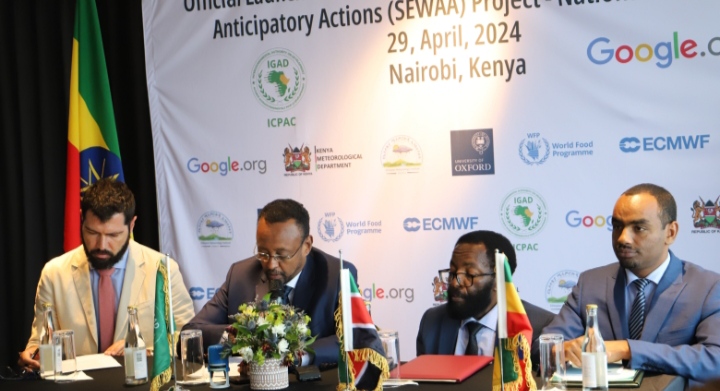Kiambu,
Tuesday April 30, 2024
KNA by Wangari Ndirangu
The Inter-Governmental Authority on Development (IGAD) Climate Prediction and Applications Centre (ICPAC) has announced support of a pioneering project titled ‘’Strengthening Early Warning Systems for Anticipatory Actions.The funding that comes from the Google.org funding through United Nations World Food Programme (WFP)to enhance disaster preparedness in Eastern Africa aims at leveraging machine learning to enhance early warning information systems and marks a collaborative effort involving leading weather and climate research institutions, a university, and a humanitarian organisation.
The funding will also benefit the Kenya Meteorological Department and Ethiopian Meteorological Institute, aiding in the enhancement of their national and sub-national forecasts.
By transforming the quality of early warning information available to communities in disaster-prone regions, the project endeavours to facilitate proactive responses to critical alerts.
Dr Guleid Artan, Director at the IGAD Climate Prediction and Applications Centre speaking Monday during the launch of Strengthening Early Warning Systems for Anticipatory Actions (S EWAA) project expressed enthusiasm for the collaboration, highlighting the combination of expertise in weather forecasting, disaster risk reduction, and technological capabilities.
He said, “With the involvement of partners such as Google, the University of Oxford, the Ethiopian Meteorological Institute, the Kenya Meteorological Department, and the World Food Programme, the project aspires to revolutionise early warning systems in the IGAD region and enable communities to prepare and act preemptively against impending hazards.”
Given the exacerbation of natural hazard-induced disasters by climate change, the importance of timely and accurate early warning systems cannot be overstated.
Supported by Google.org, this project endeavours to address this pressing need by harnessing cutting-edge technology and innovative approaches.
Through the utilisation of artificial intelligence, machine learning, and data analytics, the project further aims to enhance the accuracy and timeliness of disaster alerts, empowering communities to take proactive measures to safeguard lives and livelihoods.
Deputy team lead for food systems climate change, resilient livelihoods and gender equality in the regional bureau for eastern Africa at the WFP, Pedro Mortara said extreme weather events like floods have destroyed livelihoods in the region.
He noted that the partnership with the IGAD will foster the exchange of the latest scientific knowledge that will impact the livelihoods of communities across a region already reeling from climatic shocks.
Initially, the project will focus on pilot implementations in Kenya and Ethiopia, with the lessons learned informing the scaling-up of initiatives across the region.
Ultimately, the goal is to ensure that vulnerable communities throughout the IGAD region have access to life-saving early warning information and that they can take timely action in the face of impending disasters.
Heavy seasonal rainfall has caused devastation throughout the East African region.
El Niño may be playing a role. The current positive Indian ocean dipole influenced by record warm ocean temperatures in the north-west Indian ocean might have influenced the extreme rainfall according to WMO climate expert Alvaro Silva.Kenya currently is experiencing flooding across the country that has caused havoc across countries.
So far the country has lost over 100 people according to the Government spokesperson Isaac Mwaura who noted that the number of casualties could likely be higher due to unreported drowning incidents across the country.
Courtesy; KNA





